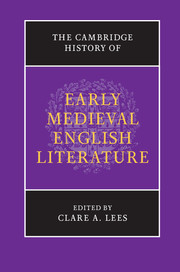Book contents
- Frontmatter
- Contents
- List of Illustrations
- List of Contributors
- Acknowledgements
- List of Abbreviations
- Introduction: literature in Britain and Ireland to 1150
- I WORD, SCRIPT AND IMAGE
- II EARLY ENGLISH LITERATURE
- III LATIN LEARNING AND THE LITERARY VERNACULARS
- 19 In measure, and number, and weight: writing science
- 20 Legal documentation and the practice of English law
- 21 Latinities, 893–1143
- 22 The authority of English, 900–1150
- 23 Crossing the language divide: Anglo-Scandinavian language and literature
- 24 European literature and eleventh-century England
- 25 Gaelic literature in Ireland and Scotland, 900–1150
- 26 Writing in Welsh to 1150: (re)creating the past, shaping the future
- Bibliography
- Index of manuscripts
- Index
21 - Latinities, 893–1143
from III - LATIN LEARNING AND THE LITERARY VERNACULARS
Published online by Cambridge University Press: 05 February 2013
- Frontmatter
- Contents
- List of Illustrations
- List of Contributors
- Acknowledgements
- List of Abbreviations
- Introduction: literature in Britain and Ireland to 1150
- I WORD, SCRIPT AND IMAGE
- II EARLY ENGLISH LITERATURE
- III LATIN LEARNING AND THE LITERARY VERNACULARS
- 19 In measure, and number, and weight: writing science
- 20 Legal documentation and the practice of English law
- 21 Latinities, 893–1143
- 22 The authority of English, 900–1150
- 23 Crossing the language divide: Anglo-Scandinavian language and literature
- 24 European literature and eleventh-century England
- 25 Gaelic literature in Ireland and Scotland, 900–1150
- 26 Writing in Welsh to 1150: (re)creating the past, shaping the future
- Bibliography
- Index of manuscripts
- Index
Summary
We cannot fully comprehend any progression of English-language texts between the tenth and the twelfth centuries without considering the effects of a profound and complex interlingualism. Relations with texts in other insular languages – and often most powerfully with those in Latin, the artificially acquired language of high culture – will inflect any literary trajectory we might trace, at least as extensively as will narrowly intralingual dynamics. The cultural capital of vernacular literary production necessarily stands in a series of shifting and specifically negotiated relations with an artificially mastered, and so in some sense always alienated, Latinity.
At the same time, we would do well to reinterpret the problematically inexact construct of ‘Anglo-Latin literature’ as a particular tranche of English literary production, in full awareness of the horizontal continuities it intersects: above all, the continuous alternative possibility of the English vernacular; but also the increasingly subaltern vernacular possibilities of Welsh and Irish; the privileged position of Old Norse at the Anglo-Danish court in the eleventh century; the increasingly subaltern status of English itself in the decades following 1066 (a status which nevertheless bears continued interrogation in relation to the rhetorical pragmatics of individual texts); and the permeability of the Insular Latin tradition to continuous interaction with continental texts, writers and readers throughout our period (both before and after the abrupt consolidation of Norman cultural hegemony and with it the greatly enhanced status of Norman French).
- Type
- Chapter
- Information
- The Cambridge History of Early Medieval English Literature , pp. 530 - 553Publisher: Cambridge University PressPrint publication year: 2012



